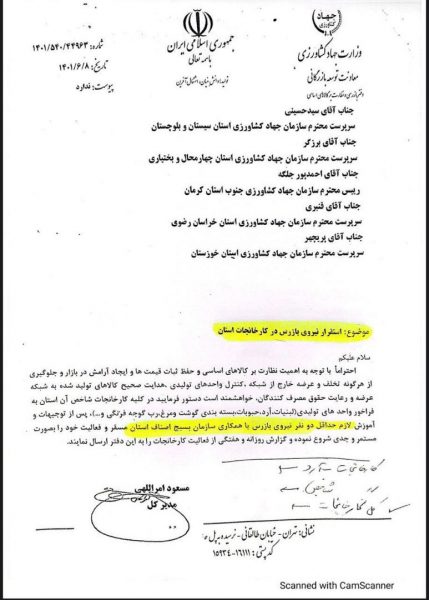Raisi’s New Generosity Becomes a Burden for Producers
Raisi’s new generosity has become a burden for producers as an unusual directive issued by the commercial manager of the Ministry of Agriculture Jihad has provoked reactions from private sector producers. According to this directive, two inspector forces are to be stationed in each factory producing essential goods in cooperation with the Basij Organization of Guilds. In other words, the Ministry of Agriculture has obligated private sector producers to employ two Basij members.
In a situation where the society is grappling with numerous mental challenges, the Ministry of Agriculture of the Thirteenth Government has issued a controversial directive. This directive means the compulsory employment of two Basij members in each production unit by the private sector. Essentially, the government intends to create jobs for Basij members by exerting additional pressure on domestic producers.
This directive, issued by the commercial manager of the Ministry of Agriculture, obligates producers of essential goods such as dairy, flour, legumes, packaged meat, chicken, and tomato paste to employ two Basij inspectors.
This decision is made less than a month after the news about the presence of more than 20,000 clerics in banks became controversial. A plan that, despite the Central Bank’s denial, has now been revealed to have roots in reality, and the government intends to have a cleric permanently stationed in each bank branch.
Basij Becomes a Burden on Production
At first glance, the plan to employ two supervisory forces from among the members of the Basij Organization of Guilds in private sector production units seems just an unreasonable plan. However, experts believe that such an action can not only disrupt the path of investment but also shrink the people’s table. If such a directive is to be implemented, a large number of private sector producers will undoubtedly face a new lever for interference in their businesses.
This issue, along with dozens of other obstacles in the field of free production, can mean an increase in investment risk in the production sector. Therefore, economists believe that such actions are in complete contradiction with Raisi’s electoral slogans.
Raisi not only did not eliminate mandatory pricing and government interference in the economy, but now has made clerics and Basij a burden on the country’s production and economy. In fact, with this action, Ebrahim Raisi’s government has directly involved clerics and Basij members in the people’s livelihood, as the compulsory employment of two forces in production units will undoubtedly increase the cost of producing essential goods.
This ultimately means an increase in consumer prices for essential goods. Therefore, it can be said that it is the people who have to pay the cost of the government’s generosity to the Basij members. Hence, if it is said that Basij and clerics have become a burden on the economy, it is not an unfounded statement.
Raisi Meant Employing Basij Members by Job Creation
In the past year, the government has implemented many strange and illogical plans that have resulted in nothing but increased production costs. Among these plans, one can mention the obligation to print the producer’s price on goods and the reduction of logo and brand size. A plan that not only failed to lead to a reduction in consumer prices but also resulted in conflicts between people and small retailers in supermarkets.
On the other hand, implementing such plans has led to increased production costs. Therefore, the final cost for the producer has increased, and naturally, the price for the consumer has also experienced a significant jump. In reality, Raisi’s strange and unreasonable government plan not only did not solve people’s problems but significantly reduced purchasing power.
Now this question arises: Was the government’s plan for job creation the compulsory employment of clerics and Basij members in various sectors of the country’s economy? Who was the audience for Raisi’s electoral promises and slogans? Does Raisi’s definition of people limit to specific groups who perhaps align with him and his government? It seems that Ebrahim Raisi’s government’s welfare plans, including employment, loans, and banking facilities, improving the business environment, and extensive changes in the banking system, all conclude in serving groups with thoughts and beliefs close to the government, and ordinary people have no place in these programs.
In the past, Iran Gate has published a related article to this writing.
The People Pay the Cost of Raisi’s Generosity


